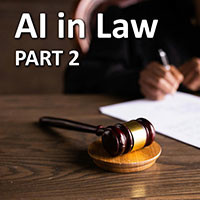 You’ve probably heard the terms AI agent and agentic AI floating around lately. They sound similar—almost interchangeable—but they describe two very different stages in how artificial intelligence actually works. If you’ve been wondering what’s what (and which one might soon be helping your law firm run smoother), this is for you.
You’ve probably heard the terms AI agent and agentic AI floating around lately. They sound similar—almost interchangeable—but they describe two very different stages in how artificial intelligence actually works. If you’ve been wondering what’s what (and which one might soon be helping your law firm run smoother), this is for you.
A Quick Refresher
AI—short for Artificial Intelligence—is simply technology that can learn, reason, and make decisions.
But not all AI is created equal.
Right now, most tools lawyers use fall into the AI agent category: they help with specific, well-defined tasks.
What’s emerging next is agentic AI—systems that can think in terms of goals, take initiative, and get things done on your behalf.
Let’s break that down in plain English.
AI Agent = The Helpful Paralegal Who Follows Instructions
An AI agent is like a dependable paralegal who works straight from your checklist.
You tell it what to do—“summarize this deposition,” “sort these emails,” “generate a first draft”—and it does exactly that.
It’s smart, efficient, and accurate… but it doesn’t make its own decisions.
If the situation changes, it waits for new directions.
Examples:
- A chatbot answering client FAQs on your website.
- A scheduling tool finding open meeting times.
- A security system locking a user account after too many failed logins.
Each of those is an AI agent: fast, focused, and helpful—but always following orders.
Agentic AI = The Proactive Associate Who “Gets It”
Now picture an associate who doesn’t just wait for assignments—they anticipate what’s needed.
They know your goals, understand context, and take the right steps without constant direction.
That’s Agentic AI.
It’s the next evolution—AI that can:
- Set its own small goals to achieve a larger one,
- Take initiative within your guidelines, and
- Coordinate multiple tasks or tools to reach an outcome.
Example:
An agentic AI might notice a filing deadline coming up, check whether the client documents are ready, draft what’s missing, and send you a reminder for review.
You didn’t have to tell it every step—it understood the objective and managed the process.
AI Agent = Task follower
Agentic AI = Goal achiever
What This Means for Law Firms
This shift from reactive to proactive is huge for legal work.
Imagine:
- Cybersecurity tools that detect risks before they hit your inbox.
- Document systems that prep filings ahead of deadlines.
- Billing software that spots missing entries and drafts summaries for review.
Agentic AI turns your tech stack into a quiet, reliable partner—one that keeps you compliant, efficient, and calm under pressure.
It’s not replacing your expertise.
It’s helping you protect it—by clearing away the clutter that keeps you from the work only a human lawyer can do.
The Bottom Line
AI Agents do what you ask.
Agentic AI helps you get what you actually want.
And that’s the direction technology is headed—toward systems that understand your goals, respect your boundaries, and handle the heavy lifting with grace.
Call to Action: Ready to Explore What’s Next?
Agentic tools are coming fast, and understanding them now will help your firm stay secure and competitive later.
If you’d like a plain-English conversation about how AI is evolving—and what’s safe, smart, and compliant for your practice—we’re here to guide you.
Let’s talk about how to put AI to work for you—safely, simply, and strategically.
Previous: AI in Law – A Calm Start for a Changing Profession
Next: Practical Ways AI Can Support a Law Firm Right Now


